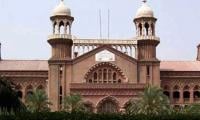Health experts at the Jinnah Postgraduate Medical Centre (JPMC), including Professor Iqbal Afridi of the psychiatry department and Dr Amna Asad, urged citizens not to cut down Conocarpus and instead plant native trees of their choice such as Neem, Gul Mohar, Amaltas, Peepal, Moringa and others to make the city green.
“False information regarding Conocarpus is being circulated largely through social media, lacking scientific grounds with reference to experts’ names along with a false ruling by the Sindh High Court, claiming its plantation illegal,” Afridi warned while planting different saplings at the health facility on Friday. This has led to extreme measures being adopted to uproot Conocarpus, he added.
“Similar disinformation was spread in the past when a large number of Eucalyptus plants were officially destroyed as they were declared anti-environment without any scientific basis,” Afridi mentioned.
Conocarpus, a non-native plant of Karachi, is a mangrove plant which was planted extensively from 2008 onwards in the metropolis. Around 2.2 million trees were planted by the then City District Government at a high cost.
Afridi said the rising temperatures of the metropolis are not due to the widespread Conocarpus trees, but were a result of the ‘urban heat island effect’ which is caused mainly by high-rise concrete buildings and black bitumen roads that absorb and trap solar radiation during the day.
The plantation drive at JPMC was launched by Executive Director Dr Seemin Jamali on Independence Day when she planted various saplings at the hospital and urged each staff member to plant at least one sapling and take care of it until it fully grows into a tree.
The Department of Psychiatry initiated a similar drive at the institution much earlier by planting more than 5,000 plants and, recently, 500 Moringa plants.
It is suggested that policymakers should think twice before taking action as these high-level decisions not only involve massive funding but also utilisation of human resources, Afridi urged.
“About five million native species such as Peepal, Amaltas, Gul Mohar, Barna, Neem, Coconut and Moringa should be planted first to overcome the Conocarpus situation, while restraint should be exercised in the intense and sudden removal of this exotic species,” he concluded.
Plantation drive launched
Meanwhile, the Karachi chapter of the Rotary Club has launched tree plantation campaigns under the slogan of ‘Hara Bhara Pakistan’ (Green and Prosperous Pakistan) at the Consulate General of Malaysia with a pledge to make the country green and environment-friendly.
Consul General of Malaysia in Karachi Khairul Nazran Abd Rahman and acting president of the Rotary Club, Karachi Muhammad Rizwan Adhia, along with the Rotary team, planted saplings in the Malaysian Consulate’s garden, stated a press release.
The Consul General appreciated the efforts made by the Rotary Club and described it as a great step towards ensuring a healthy environment and economic prosperity by achieving better climate conditions in the country.
“The increasing global warming has become a serious threat to the world, which requires aggressive measures to rectify the unfortunate climatic change,” Rahman said, adding that Malaysia shared the sentiment and the government has come up with a national green technology programme encapsulating many projects.
“Under this programme, we have made our capital city, Kaula Lumpur, green and clean,” he said, stating that Karachi too could be turned into a green city.
The Consul General further said that global warming occurred as a result of rapid development by human beings, therefore, it is our duty to save the planet for the next generation. “Trees play a great role in saving mankind from diseases and other natural calamities,” he added.
Adhia, the acting president of the Rotary Club expressed his joy over Prime Minister Imran Khan’s announcement for a national plantation programme.
The armed forces have also committed to playing an active role in such drives, he said, adding that after making Karachi green and clean, the Rotary Club would move to other areas of the country with the same spirit.
Adhia, who is also a senior vice chairman for the Association of Builders and Developers (ABAD), said its members have started constructing buildings with green spaces to help save energy.
He added that the Rotary Club has urged other important organisations in the public and private sectors to become partners in its tree plantation programme.
Deputy managing director of the Bahria Foundation, Commodore Akbar Naqi, director of Medicam Group, Khurram Nanitalwala and prominent architect Kafeel Hussain, were also present on the occasion.
This picture taken on January 30, 2023, shows commuters passing through the Empress Market in Pakistan's port city of...
Students give an Admission Entry Test for the Academic Session Fall 2025 in Aror University on April 13, 2025. —...
Students give a mega IT test at its PAF branch on Sharea Faisal on April 13, 2025. — Screengrab via...
Sindh Chief Secretary Sindh Asif Hyder Shah chairs a meeting on April 12, 2025. — Screengrab via...
This representational image of fishermen pull a fishing net ashore at the Clifton beach in Karachi. — AFP/FileThe...
Karachi Water & Sewerage Corporation CEO Ahmed Ali Siddiqui looks on in this image released on March 26, 2025. —...







